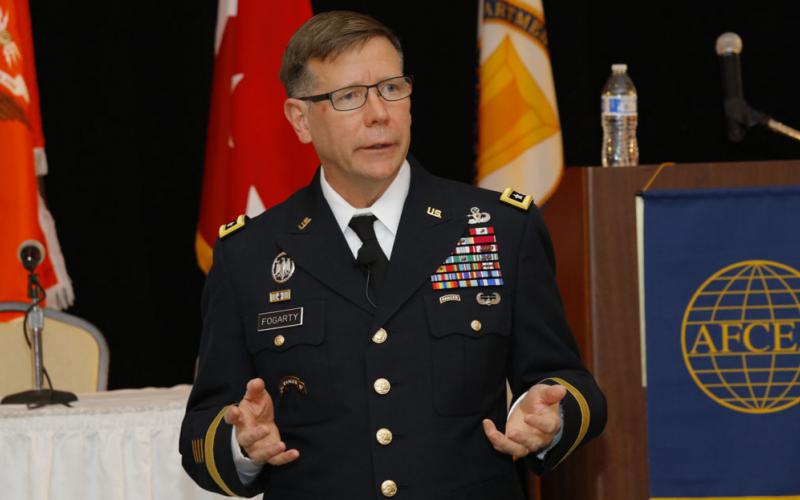 The Army is transforming its Cyber Command to meet the challenges of a multidomain battlefield. Just over eight years old, the command, located at Ft. Gordon, Georgia, will evolve by 2028 into something possibly called the Army Information Warfare Operations Command, which will fully incorporate cyber, electronic warfare and information operations.
The Army is transforming its Cyber Command to meet the challenges of a multidomain battlefield. Just over eight years old, the command, located at Ft. Gordon, Georgia, will evolve by 2028 into something possibly called the Army Information Warfare Operations Command, which will fully incorporate cyber, electronic warfare and information operations.
Lt. Gen. Stephen Fogarty, USA, commanding general, Army Cyber Command, made the announcement to Army Signal leaders and industry at AFCEA’s 2019 Army Signal Conference in Springfield, Virginia, on March 13. “That is the big idea and that's what we're moving toward rapidly,” he said.
The plan involves the move of the Army’s information-related operations out of Ft. Belvoir, Virginia, to Ft. Gordon by May or June of 2020, the commander said.
Gen. Fogarty acknowledged that the naming convention was still evolving. “I'm absolutely aware that information operations or information warfare is a very loaded term,” he said.
The United States’ allies—in particular the United Kingdom and Australia—are “in the same place as we are” in adding information-related capabilities, and are referring to it as “influence maneuver,” Gen. Fogarty clarified. “But I’m not sure that is the term we want to use, although we are open minded. So I describe it as the Army Information Warfare Operations Command, but that is a descriptive name [for now].”
The command, already revamping its electronic warfare capabilities and fielding offensive and defensive cyber components, will now turn its focus over the next 18 months to mounting its information warfare. “We already are working on it, gaining reps [repetitions] in Afghanistan, and hosting several pilots at the tactical level and the strategic level,” the general stated.
He explained that information warfare would echo to a certain extent traditional battlefield tactics of knowing how the adversary employs deceptive tactics. “What's the decoy?” he asked. “What's a false signature? What is the atmosphere they are using to see me? I need to filter that very, very rapidly. I can’t be fooled by it as they work deception against me.”
The addition of robust information operations would not necessarily be straightforward, Gen. Fogarty cautioned. “The hardest part is the information environment,” he said. “That's what we struggle with, is to be able to sense and understand that [environment] at the speed that I believe is required to be able to turn inside the adversary.”
The tradecraft will have to harness the Internet. “That's what we're going to have to take advantage of and filter that rapidly,” the commander continued. “I have to be able to assign a level of relevance [to information.] I think because of the volume, the velocity of new information and the native language on the Internet, that becomes very, very challenging.”
Gen. Fogarty did point out that the Army was unique to a certain extent in how it is housing its information operations alongside cyber and electronic warfare.
While all of the U.S. military services are taking steps to improve their information warfare, “we have some responsibilities that the other service cyber components don’t have,” he said. “They don't have information operations. They don't have electronic warfare in their cyber portfolio. What we do share with them is this requirement to operate and defend the network, data and weapons systems, … and conduct offensive cyber space operations. But I think it makes it much more coherent than my service counterparts because I own the majority of what it takes to conduct information warfare.”
The general stressed that the key to the future success of the military was the domination of information. The integration of cyber, electronic warfare and information operations is a fundamental aspect of this success. “It’s not just cyber,” he said. “The power we are going to project globally is in information.”
He added that the Army’s network—and the key modernization efforts of its tactical network and enterprise systems—is going to be “the critical capability” that will enable the service to fight and win on a modern battlefield.
“It’s this idea that whoever can sense, understand, decide and act faster than the adversary enjoys the decisive advantage,” Gen. Fogarty said. “With the lethality of kinetic weapons that we’re seeing proliferating across the battlefield, if you can be seen and you can be acquired, then you can be hit by modern weapons. And If you're hit by those weapons, you will be killed or your weapon system will be destroyed. Your army will be defeated. And I think, it's the same way, frankly, on the nonkinetic side. And in many respects that may be more important.”
No comments:
Post a Comment